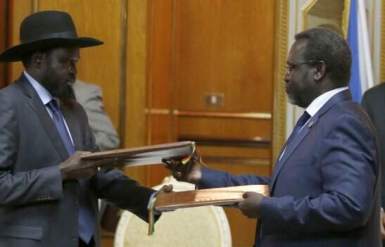South Sudan peace deal receives mixed reactions
June 12, 2014 (JUBA) – South Sudan’s peace deal which the country’s rival leaders signed on Tuesday aimed at ending six months of conflict has received mixed reactions from citizens, with analysts citing uncertainty surrounding the failure of previous agreements to halt the violence.

The signing followed a meeting between the two rival leaders on the sidelines of an extraordinary summit in the Ethiopian capital, Addis Ababa, which was convened by the International Governmental Authority on Development (IGAD) to discuss the South Sudan situation.
Nyoka Alberta Pitia Samuel, a resident of Juba from Central Equatoria state, expressed optimism of the possibility of peace and harmony in the country, but said there remained significant mistrust in affected communities.
“It is an historic moment for our people who are eager to return to their homes. The victims of this conflict will have a reason to smile as this agreement raises their hopes,” she told Sudan Tribune on Thursday.
“Nothing is [an] impossibility to achieve if there is a will. I know some people are talking about the damage and the mistrust, as well as the shame this conflict had brought on the country, but I hope things would change and we will have normal relations among our communities,” she added.
Conflict in South Sudan broke out in mid-December last year following escalating political tensions within the ruling SPLM.
TARNISHED IMAGE
Bol Chan Mawien, a native of Warrap state presently in Juba, said the conflict had severely damaged the image of the new nation in the eyes of the international community and portrayed its leaders as power hungry figures.
“It has really damaged our pride to find ourselves in this situation,” said Mawien. “We believed our leaders could have shown understanding to solve their own differences through dialogue, but it seems not.”
He said recent events had left South Sudanese people, including himself, depressed and had killed off the optimism the country experienced after seceding from Sudan in 2011, after a protracted civil war spanning more than two decades.
“The feeling that things must get better is no longer there. There’s no pride in being a happy people anymore. The killing has gone on for too long,” he said.
DIFFICULT TO BE OPTMISTIC
Meanwhile, Juba-based analyst Anthony Sebit said it remains to be seen how the agreement, signed under enormous pressure from the regional and global community, would be implemented on the ground.
“This is a welcoming development. It allays fears and raises hope for peace but the reading is that this agreement was signed under pressure from the region,” he told Sudan Tribune in an interview on Thursday.
He said both Kiir and Machar would need to get there military forces in the field on board if the agreement is to succeed.
“It is one thing to talk to the politicians in Addis Ababa and in Juba and it is completely another talking to the generals and the fighting forces in the fields,” said Sebit, adding that past violations by both sides of an existing ceasefire deal “makes it difficult for someone to be optimistic about this agreement”.
The leader of the opposition group in parliament, Onyoti Adigo, has expressed concern over the 60-day time period for negotiations, saying there was limited time to discuss the fundamental issues agreed to by the parties to the conflict with the full participation of other stakeholders.
Adigo warned that any attempt to undermine the wider participation and inclusiveness of all political forces and relevant stakeholders would create further violence and division, particularly at a time when leaders will be fighting for positions in a proposed transitional government.
“The devil will be in the details of this agreement, but [we] hope the spirit of negotiation will prevail to overcome differences. We believe that movement forward is critical,” said Adigo on Thursday.
The opposition figure added that there are concerns that negotiations towards a transitional government may lead to further instability on the ground as both sides attempt to strengthen and consolidate their positions for political gains.
RISK OF FAMINE
The head of UK-based relief organisation Oxfam has warned of the risk of famine and spread of cholera should fighting continue.
People “have been forced to endure too much in the past six months – conflict, hunger and displacement – it can’t be allowed to go on any longer,” Oxfam’s South Sudan director Cecilia Millan said on Wednesday.
Eastern Equatoria state governor Louis Lobong Lojore has downplayed speculation that the elected governments, including those in the states, would be dissolved under the agreement.
He clarified that the cabinets, both in Juba and states, would be enlarged to accommodate some representatives of the opposition in order to pave a way for democratic elections in the country.
However, Lojore has warned officials against defecting to the opposition with the aim of securing political positions, saying only a few from the opposition would benefit.
The fighting in South Sudan has pitted government troops loyal to Kiir against rebel forces aligned with Machar, comprising largely of ethnic Nuer militia and dissident soldiers.
Thousands have been killed since the conflict broke out and than 1.3 million displaced, with aid agencies repeatedly warning the country is headed for a humanitarian catastrophe.
IGAD mediators had earlier expressed concern over the failure by the two warring parties to adhere to provisions of signed ceasefire agreements, warning of tougher consequences unless the rival sides took steps to end the violence.
(ST)
